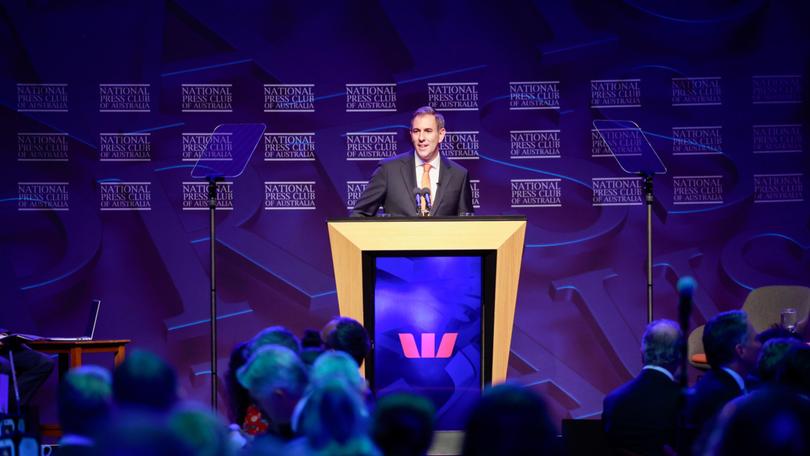NICOLA SMITH: Jim Chalmers’ Federal Budget sold but not bold
NICOLA SMITH: The Government has been handed an unexpected gift from the Budget — a knee jerk Coalition response to its surprise tax cuts.

It was the morning after the Budget, the pageantry was coming to an end, and the stage set for an election campaign which — like the economy — was rounding a corner.
A chirpy Treasurer showed little sign of the stress of churning out the pre-poll Budget nobody had expected as he presented his economic blueprint for Labor’s second term while a lunch of char-grilled Gundagai lamb and Binnorie brie was served to a packed audience in Parliament’s Great Hall.
The books had been branded a “weird, little budget” and lacking “strategy and vision” by business leaders crammed into in the grand chamber alongside Cabinet members and journalists.
Sign up to The Nightly's newsletters.
Get the first look at the digital newspaper, curated daily stories and breaking headlines delivered to your inbox.
By continuing you agree to our Terms and Privacy Policy.But the critique did little to dampen Jim Chalmer’s mood as, flanked by two giant screens bearing his portrait, he boasted of 664 hours spent forging Labor’s economic vision next to framed paintings of Australian lorikeets in the Cabinet Room.
He had been handed an unexpected gift from the Budget — a kneejerk Coalition response to his surprise tax cuts policy that saw the Opposition, traditionally the champion of low taxation, immediately blast it as a “cruel hoax” as they grappled with a strategic quandary.
“Australians would be much worse off if Peter Dutton had his way and they’ll be worse off still if he wins. This brain snap from Angus Taylor on tax makes that crystal clear,” quipped Dr Chalmers.
With a spring in his step, he bantered with journalists and said he looked forward to an election centred on the economy.
But there is one vital question the Treasurer continuously avoids.
“You’ve often said since becoming Treasurer that you believe Australians understand the need to have tough adult conversations about the economy,” said one journalist.
“Why not use the opportunity to go further to address the structural deficit issues in the budget, take it to an Election within weeks and get a mandate?”
But as growing deficits stretch into the foreseeable future, it’s a political risk no major party is ready to take.
“In every Budget … you have to strike the best balance you can between budget repair, investing in the cost-of-living and investing in the future. And that’s what we’ve tried to do to strike that most effective balance we can,” Dr Chalmers said.
“We’ve actually made more structural progress in the Budget than most people recognise,” he said, pointing to reforms to make the NDIS “more sustainable” and “transformational” changes to age care.
“Even with all this progress on Budget repair, we don’t pretend that the job is finished. One of the reasons we’re asking Australians, respectfully, for other term of government, other term income, is because we know that there’s more work to do,” he said.
Asked again to respond to the drum beat of calls for broader tax reforms, and whether a four-year term should be a put to a referendum, the Treasurer side-stepped the question, insisting the “reform wheel” was still turning even in a short three years in office.
But economists and business leaders have been lining up to criticise Tuesday’s Budget for tinkering around the edges with pre-Election sweeteners, while avoiding major structural changes that need to be made.
“The fact that we are facing deficits, structural deficits over the coming years, I think will reduce our flexibility, will reduce our ability to respond to future economic challenges and undertake very necessary economic reforms,” a frank Andrew McKellar, CEO of the Australian Chamber of Commerce and Industry, told reporters.
“Superficial” tax cuts were no substitute for “hard decisions” to get spending back under control, he said.
EY’s chief economist Cherelle Murphy said while cost-of-living measures would be welcomed by many, they were made at the expense of fiscal deficits that would last for years, she said.
“We would like to have seen the Treasurer acknowledge the need for a better tax system in the current tough environment and lay out some ambitions for the next term of Government.”
Ms Murphy believes the public would be willing to accept bold policies for the long term good of the country.
“They just have to be sold as such,” she said. “We need to spend more effort on making it clear why some of these reforms are needed.”
But as the Election looms, it appears this ‘tough adult conversation’ is one that even Labor’s master communicator is unwilling to start.

